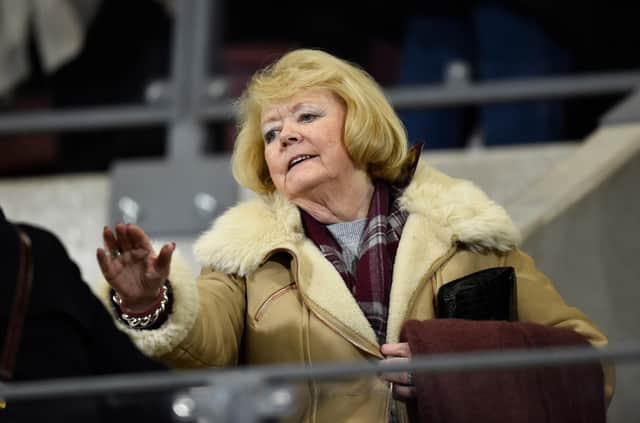Why Ann Budge was right to cut wages and not defer at Hearts


Imposing player wage cuts rather than deferrals crucially reduces Hearts' costs whilst football is suspended. Several other Scottish Premiership clubs agreed to defer money and reimburse their squads at a later date, but the Tynecastle Park owner Ann Budge showed plenty determination as she negotiated temporary salary reductions.
It would not have been a pretty experience as a number of players, through their union, PFA Scotland, pushed for deferrals. However, the move was an important part of Budge's resolve to help her club survive the growing financial crisis taking hold as a result of the coronavirus pandemic.
Advertisement
Hide AdAdvertisement
Hide AdThe subsequent decision to place players on furlough leave further eases the strain as the Government will cover 80 per cent of salaries up to a maximum of £2500 per month. The alternative to wage cuts, as Budge made clear, was suspending contracts and payments under the infamous clause 12. Again, hardly an attractive option.
A lot of sympathy – and expenditure
Those who chaired the Hearts board before her sympathised with the predicament, even if the vast number of player signings she sanctioned contributed to a wage bill which left little room for manoeuvre once football matches stopped in March.
Les Deans, Hearts chairman from 1994 to 1999, knows the Tynecastle boardroom territory well, although he never had the misfortune of having to navigate a way through a global health crisis. The significance of enforcing salary cuts over deferrals is not lost on the Edinburgh businessman.
Hearts' total staff costs – including all football and non-football staff – were £8.2million when their last accounts were published in June 2019. There is good reason to assume that figure has risen since then due to the signings of Craig Halkett, Jamie Walker, Conor Washington, Steven Naismith, Glenn Whelan, Loic Damour, Liam Boyce, Donis Avdijaj and Marcel Langer, plus loanees Joel Pereira, Ryotaro Meshino and Toby Sibbick.
Advertisement
Hide AdAdvertisement
Hide AdBudge realised immediately upon football's shutdown that staff needed to take a drop in pay to mitigate the missing income from games. Captain Steven Naismith quickly agreed a 50 per cent reduction, whilst manager Daniel Stendel said he would work without a wage.
For the rest, deferrals were never really likely to work. Needing to find a significant chunk of money at a later date would simply have created more problems when that time arrived.
‘Horrific situation’
"The way Ann Budge has handled this has been absolutely correct," Deans told the Evening News. "To defer wages is just kicking the can down the road. If you cut the wage bill, it's a different ball game.
"What we are looking at is a horrific situation. Scottish clubs rely on gate money and season ticket money, end of story. It's entirely different in England, where clubs can exist easily without a penny coming through the turnstiles because of the amount of money Sky Sports and BT Sport pour in season after season."
Advertisement
Hide AdAdvertisement
Hide AdLike many others across the Scottish football spectrum, Deans harbours doubts about whether all 42 senior clubs will survive this pandemic. Allowing fans to attend matches may not happen until well into next year and some will toil to stay afloat without gate income.
Likely casualties
"It's all very well saying clubs can let players go to reduce expenditure, but there are other ongoing costs associated with football clubs. You have maintenance of stadiums and a myriad of other things needing paid," explained Deans.
"What the future is for Scottish football, we don't know. Will there still be 42 clubs still standing when we get back playing again? I'm not convinced there will be. From the comments the First Minister has made, I get the feeling that we won't have professional football with fans in Scotland this year."
Why closed doors may bring more problems
The option of matches behind closed doors is fraught with difficulty. Again, one of the biggest issues is finance-related. The English Premier League are considering this option to end season 2019/20 but, as Deans pointed out, much of their income stems from broadcasters. In Scotland, the majority of clubs' revenue is generated from season tickets and matchday earnings.
Advertisement
Hide AdAdvertisement
Hide Ad"We could play behind closed doors. In theory, that could be done if everything is put in place. However, that does not bring clubs income," argued Deans. "In fact, you could argue that is the worst of all scenarios. Clubs would have the expenditure but without the income.
"They would need to keep a full squad and would therefore still have all the costs. If football is closed down, the clubs don't have all the costs of keeping players and having to pay all their salaries.
"It is not an easy situation and you have to have a degree of sympathy for the chairmen dealing with all these different factors. We can only hope there are better times not too far round the corner."
- Thank you for reading this story on our website. While I have your attention, I also have an important request to make of you. In order for us to continue to provide high quality and trusted local news on this free-to-read site, I am asking you to also please purchase a copy of our newspaper. Our journalists are highly-trained and our content is independently regulated by IPSO to some of the most rigorous standards in the world. But being your eyes and ears comes at a price. So we need your support more than ever to buy our newspapers during this crisis. With the coronavirus lockdown having a major impact on many of our local valued advertisers - and consequently the advertising that we receive - we are more reliant than ever on you helping us to provide you with news and information by buying a copy of our newspaper. Thank you. Joy Yates, Editorial Director.